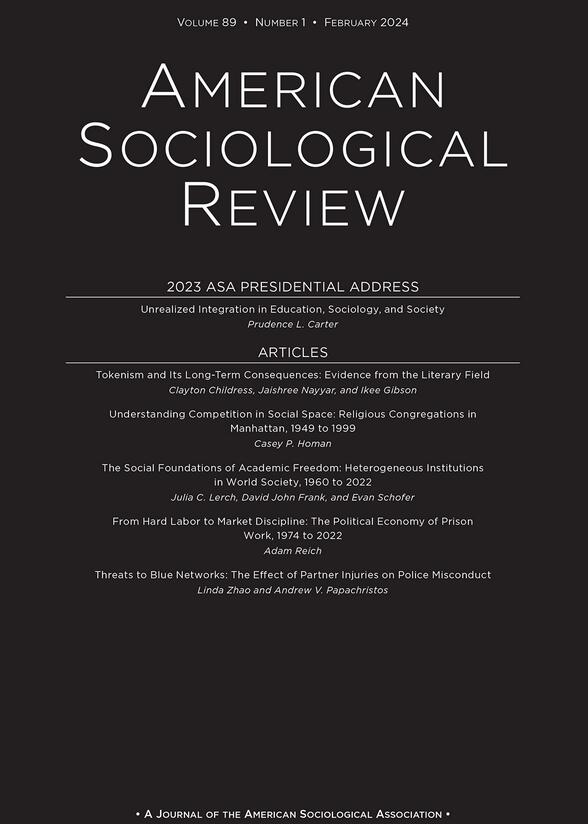轨迹保护:管理工作中不受欢迎的、模棱两可的性互动
IF 7.1
1区 社会学
Q1 SOCIOLOGY
引用次数: 7
摘要
性互动通常涉及含蓄的、模棱两可的行为,但对工作场所中不受欢迎的性互动的研究主要集中在明确的性互动上。通过对84名科技行业员工的采访,我发现,在他们的工作场所,不受欢迎的、模棱两可的性互动相对普遍。含糊不清的性互动可以有多种互动轨迹,但一种可能性是它们会导致明确的性骚扰。当受访者担心一段暧昧的性互动可能演变成性骚扰时,他们就会采取我称之为“轨迹保护”的措施,即仔细监控和引导互动,以避免出现骚扰的机会。受访者将轨迹保护描述为劳动密集型工作,可能对他们的职业生涯有害。因为女性往往对性骚扰最为警惕,所以她们不成比例地参与了轨迹保护,并冒着这样做可能付出的代价。我关注的是防止模棱两可的性互动的轨迹保护案例,但我认为,轨迹保护是一种更普遍的策略,被边缘化的人用来避免潜在的虐待。本文章由计算机程序翻译,如有差异,请以英文原文为准。
Trajectory Guarding: Managing Unwanted, Ambiguously Sexual Interactions at Work
Sexual interactions often involve implicit, ambiguous behavior, yet research on unwanted sexual interactions in the workplace largely focuses on interactions that are explicitly sexual. Drawing on 84 interviews with tech industry workers, I show that unwanted, ambiguously sexual interactions are relatively commonplace in their workplaces. Ambiguously sexual interactions can take multiple interactional trajectories, but one possibility is that they will lead toward explicit sexual harassment. When interviewees worry that an ambiguously sexual interaction might veer into sexual harassment, they engage in what I term trajectory guarding, in which they carefully monitor and guide interactions in an attempt to avoid opportunities for harassment to crop up. Interviewees described trajectory guarding as labor-intensive and potentially detrimental to their careers. Because women tended to be most wary of sexual harassment, they disproportionately engaged in trajectory guarding and risked the possible costs of doing so. I focus on the case of trajectory guarding against ambiguously sexual interactions, but I suggest that trajectory guarding is a more general strategy used by marginalized people seeking to avoid potential mistreatment.
求助全文
通过发布文献求助,成功后即可免费获取论文全文。
去求助
来源期刊

American Sociological Review
SOCIOLOGY-
CiteScore
13.30
自引率
3.30%
发文量
35
期刊介绍:
The American Sociological Association (ASA) is a non-profit membership association established in 1905. Its mission is to advance sociology as a scientific discipline and profession that serves the public good. ASA is comprised of approximately 12,000 members including faculty members, researchers, practitioners, and students in the field of sociology. Roughly 20% of the members work in government, business, or non-profit organizations.
One of ASA's primary endeavors is the publication and dissemination of important sociological research. To this end, they founded the American Sociological Review (ASR) in 1936. ASR is the flagship journal of the association and publishes original works that are of general interest and contribute to the advancement of sociology. The journal seeks to publish new theoretical developments, research results that enhance our understanding of fundamental social processes, and significant methodological innovations. ASR welcomes submissions from all areas of sociology, placing an emphasis on exceptional quality.
Aside from ASR, ASA also publishes 14 professional journals and magazines. Additionally, they organize an annual meeting that attracts over 6,000 participants. ASA's membership consists of scholars, professionals, and students dedicated to the study and application of sociology in various domains of society.
 求助内容:
求助内容: 应助结果提醒方式:
应助结果提醒方式:


